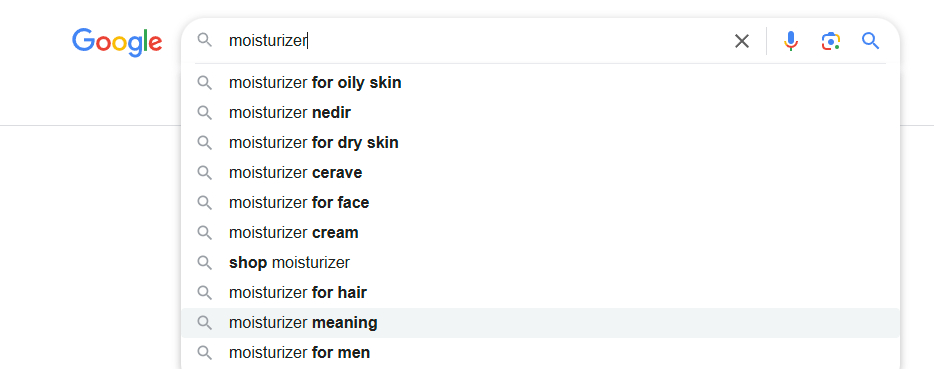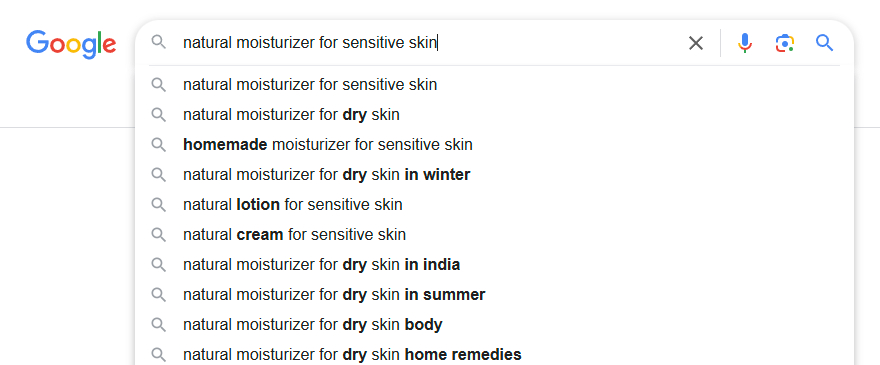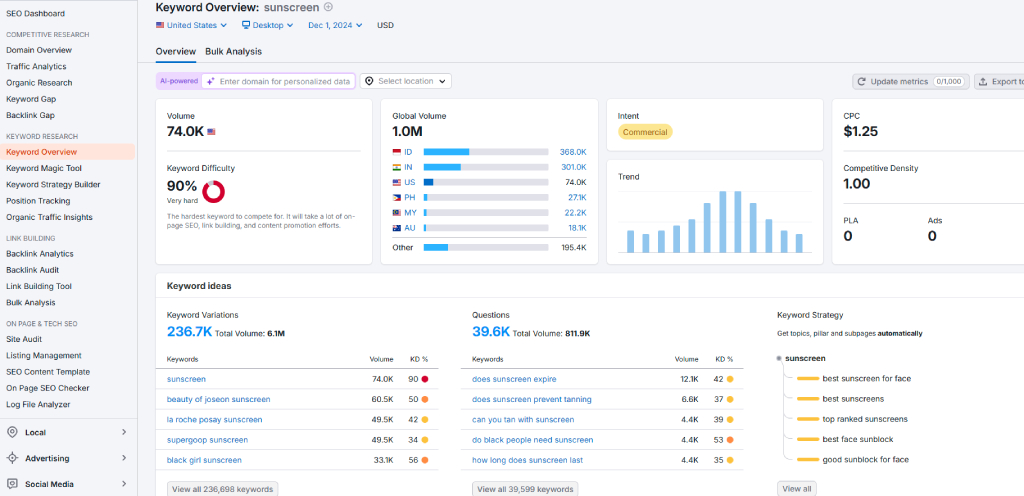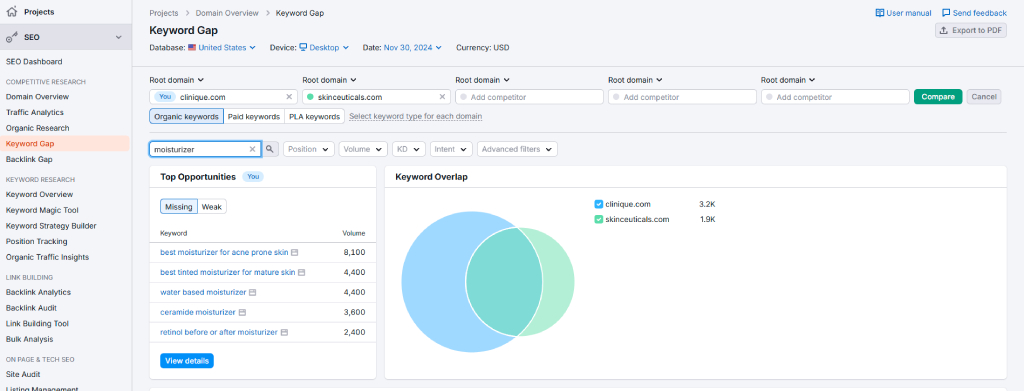Keyword phrases are multi-word search queries essential for targeting user intent and improving SEO performance. Unlike generic keywords, they are easier to rank for, attract more relevant traffic, and increase conversion rates. Tools like Google Search Console, SEMrush, and Ahrefs help businesses identify valuable keyword phrases. By optimizing content with these phrases in titles, headers, and meta descriptions, you can boost search visibility and engagement. Regular performance monitoring ensures continuous improvement. Keyword phrases are vital for achieving success in modern SEO strategies.
What Is a Keyword Phrase?
A keyword phrase (also known as a keyphrase or search query) is a specific sequence of words that you optimize a webpage for in order to rank higher in search engine results. For example, “best moisturizing cream” is a keyword phrase.
You can discover these keyword phrases through keyword research, which is the process of identifying what your target audience searches for in search engines.
Keyword vs. Keyword Phrase
In SEO, the term keyword is a general term used for both single keywords and keyword phrases. However, there are differences:
- Keyword: Short and typically one or two words long (e.g., “moisturizer”).

- Keyword Phrase: Longer, more detailed search queries (e.g., “natural moisturizer for sensitive skin”).

Using keyword phrases highlights the importance of focusing on specific, multi-word terms in modern SEO. These are often referred to as long-tail keywords.
Why Are Keyword Phrases Important for SEO?
Using keyword phrases offers several advantages for SEO:
- More Targeted and Specific:
- Generic keywords may not clearly express what the user is looking for.
For instance, with the keyword “shampoo,” it’s unclear whether the user wants to buy a product or learn more about it. - However, a phrase like “anti-hair loss shampoo recommendations” has a clear and specific intent.
- Generic keywords may not clearly express what the user is looking for.
- Easier to Compete For:
- Keyword phrases often have less competition.
For example:- Keyword: “moisturizer” (50% difficulty).

- Keyword Phrase: “natural moisturizer for dry skin” (21% difficulty).

- Keyword: “moisturizer” (50% difficulty).
- Keyword phrases often have less competition.
By targeting keyword phrases, you can attract the right audience to your site and potentially increase your conversion rates.
How to Find and Use Keyword Phrases
Discover and Optimize Keywords You Already Rank For
Use tools like Google Search Console to find the keywords you’re already ranking for:
- Go to the Search Results report in Google Search Console and enable Average Position.

- Identify keywords ranking between positions 4-10 and optimize those pages.

Optimization Tips:
- Add the keyword phrase to the title tag.
- Use the keyword phrase in the H1 tag.
- Include the keyword phrase in the URL slug (redirect old URLs if changed).
- Use the keyword phrase naturally in the meta description to increase click-through rates.
- Include the keyword phrase naturally throughout the content body.
You can also use tools like Ahrefs, SEMrush, or Moz to get more detailed suggestions through their On-Page SEO Checker tools.
Conduct Keyword Research and Create New Content
Keyword research involves finding relevant keyword phrases for your brand. Tools you can use include:
- Ahrefs Keywords Explorer: Analyze keyword volume, difficulty, and click-through rates.
- SEMrush Keyword Magic Tool:
- Enter a seed keyword (e.g., “sunscreen”) and generate related keyword phrases.
- Search Volume: Average number of monthly searches.
- Difficulty Score: The challenge of ranking in the top 10 results (%).
Example:
- Keyword: “sunscreen.”
- Keyword Phrase: “mineral sunscreen for sensitive skin.”

Focus on phrases with low competition and moderate search volume to create new content.
Discover Keyword Phrases Your Competitors Rank For
Analyze competitors’ rankings using tools like SEMrush, Ahrefs, or Ubersuggest:

- Use the Keyword Gap Tool:
- Enter your site and up to 4 competitors.
- Select “Missing” or “Untapped” to find keywords your competitors rank for, but you don’t.
Example:
- Competitors’ phrases: “best moisturizing cream for dry skin,” “natural skincare products.”
- Create content targeting these phrases to capture a similar audience.
Track Performance
After optimizing for keyword phrases, monitor your performance with tools like:
- SEMrush Position Tracking: Analyze the ranking history of your targeted keywords.
- Ahrefs Rank Tracker: Measure changes in rankings over time.
- Google Analytics or GA4: Monitor organic traffic and engagement for specific keywords.
These tools help identify which strategies are working and where additional improvements are needed.
Keyword Phrase Optimization Assistant
Unlock the full potential of your SEO strategy with the Keyword Phrase Optimization Assistant. This Python-based tool is designed to simplify keyword research, competitor analysis, and content optimization, making it an essential resource for SEO professionals. With features such as keyword extraction from Google Search Console, gap analysis with competitors using SEMrush or Ahrefs, and content optimization recommendations, this tool helps you boost your rankings and refine your content strategy. Ready to take your SEO game to the next level? Check out the Keyword Phrase Optimization Assistant on GitHub to get started and access the full project.
import fetch_keywords
import competitor_analysis
import content_optimization
import performance_tracking
if __name__ == "__main__":
print("Starting Keyword Phrase Optimization Assistant...")
# Fetch existing keyword data
fetch_keywords.get_keywords_from_search_console()
# Perform competitor analysis
competitor_analysis.analyze_competitors()
# Generate optimization recommendations
content_optimization.optimize_content()
# Track performance
performance_tracking.track_performance()
print("Reports generated in the 'data/' directory.")Keyword Phrase Frequently Asked Questions (FAQ)
What Is the Difference Between a Keyword and a Keyword Phrase?
A keyword is typically one or two words long and broader in meaning (e.g., “moisturizer”).
A keyword phrase is longer and more specific (e.g., “natural moisturizer for sensitive skin”).
What Are the Benefits of Using Keyword Phrases in SEO?
Lower competition: Long-tail keyword phrases are usually less competitive.
More targeted traffic: They attract users with specific search intents.
Higher conversion rates: Addressing users’ precise needs can lead to more conversions.
What Tools Can I Use to Discover Keyword Phrases?
Google Search Console: Identify keywords you already rank for.
Ahrefs and SEMrush: Research keywords, analyze difficulty, and compare competitors.
Ubersuggest: Find alternative and free keyword suggestions.
Google Trends: Analyze the popularity of keywords over time.
How Can I Discover Keyword Phrases My Competitors Rank For?
Use tools like SEMrush or Ahrefs Keyword Gap Tool to identify keywords your competitors rank for but you don’t.
Focus on “Missing” or “Untapped” opportunities with low difficulty and high volume.
How Can I Effectively Integrate Keyword Phrases into My Content?
Include keyword phrases in the title tag and H1 tag.
Naturally use them in the meta description and throughout the content body.
Add them to the URL slug and alt text of images.
Ensure the content remains natural and user-friendly while targeting keywords effectively.

